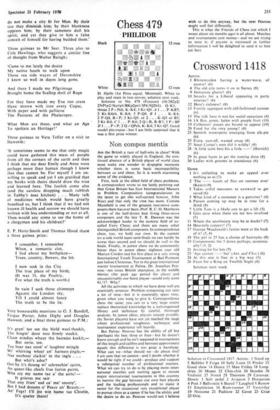Chess 479
PHILIDOR
D. Hjelle (1st Prize equal, Montreal) White to play and mate in two moves; solution next week.
Solution to No. 478 (Fossum) l6/2B2p2/ 2NP1p2/3kplpl/BKp2pr1/3P4/3Q2b1). Q-K1, threat 2 P x Pch, K-K4; 3 Kt-Q3. A 1 . . . P-KB7; 2 Kt-K6ch, K-K4; 3 P-Q4. B 1 . . . K-K4;
2 P-Q4, B xP; 3 Kt-Q3. or 2 . . . K-Q3 or B5;
3 Kt-K6. C 1 . . . P-K6; 2 Q xR, B-R7; 3 P x BP D 1 P x P; 2 Q x QPch, K-K4; 3 Kt-Q7. Good model pin-mates—but I am little surprised that it was a first prize winner.
Non compos mentis
Are the British a race of half-wits in chess? With the game so widely played in England, the con- tinued absence of a British player of world class must make one wonder in dyspeptic moments whether there is some basic incompatibility between us and chess. So it is worth examining some of the evidence.
First, look at the allied field of chess problems. A correspondent wrote to me lately pointing out that Great Britain has four International Masters in Problem Composition (congratulations to the latest to get this well-earned honour, John Rice) and that only the USSR has more. Comins Mansfield is one of the greatest two-move com- posers there has ever been, Prof. R. C. 0. Matthews is one of the half-dozen best living three-move composers and the late T. R. Dawson was the acknowledged leader in the esoteric field of so- called Fairy Chess; and there are many other distinguished British composers. In correspondence chess, too, we hold our own. In the current six-a-side world team semi-finals we can hardly be worse than second and we should do well in the finals. Finally, in junior chess we do consistently better than in senior chess: eighteen year old Marlyn Corden tied for first place in a very strong International Youth Tournament at Bad Pyrmont just before Christmas. Yet in the great international master tournament at Palma, Dr. Jonathan Pen- rose—ten times British champion, in the middle thirties (the peak age period for chess) and unquestionably our finest player—could only score 61/17. Why?
All the activities in which we have done well are essentially amateur. Problem composing can take a lot' of time—but it is essentially spare time, given when you want, to give it. Correspondence chess the same; you can to a very large extent replace theoretical knowledge by a well-organised library and technique by careful, thorough analysis. Injumor chess, players (except possibly the Soviet players) have not yet reached the stage where professional toughness, technique and tournament experience tell heavily.
But Palma: Penrose has the ability of all but (perhaps) the best three or four—but he doesn't know enough and he isn't seasoned in tournaments of this length and calibre and between approximate equals this difference is too great a handicap. What can we—what should we—do about this? I am sure that we cannot—and I doubt whether it would be right if we could—produce and support a substantial number of professional masters. What we can try to do is by playing more inter- national matches and starting again to mount major international tournaments in this country to narrow the gap between our own best players and the leading professionals and to make it easier for the occasional very exceptional player to pursue chess as a career if he has the ability and the desire to do so. Penrose would not I believe wish to do this anyway, but the next Penrose might well feel differently.
This is what the Friends of Chess (on which I wrote about six months ago) is all about. Matches and tournaments cost money—and we are trying 12 men to raise it; if anyone is interested in further information I will be delighted to send it to him (or her).


































 Previous page
Previous page